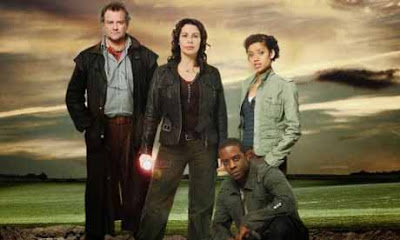Spoilers follow.
If you’ve talked with me about television recently, the odds are that I’ve told you in some detail about my love of the recent archaeological action-adventure show Bonekickers.
Each episode kicks off with a bit of archaeology, and ends in madness.
For example:
In the first episode, our intrepid heroes find an old coin at the beginning of the episode. By the end of the episode, they are having a swordfight while swinging on ropes thirty feet above the ground of an immense cavern filled with crosses brought from the Holy Land, one of which is the One True Cross, and all of which are on fire.
For example:
In the third episode, our intrepid heroes find an old coin at the beginning of the episode. By the end of the episode they are fleeing to avoid the poison gas drifting down the tunnel behind them – but the tunnel in front is blocked by an explosive minefield made from Roman hand grenades.
Now, I don’t know about you, but I love a good action-adventure show. So I’m perfectly happy with the idea of archaeologists fighting evil. I mean, it worked for Indiana Jones.
Where I think Bonekickers falls down is this: Each episode starts with the ordinary, and leads you into the realm of the bonkers.
Compare and contrast with a James Bond film. Or indeed, an Indiana Jones film. There’s a reason that they always have that huge stunt before the credits: it establishes the sort of world that Bond lives in, and more importantly, it establishes what’s possible in that world.
With Bonekickers, the world begins ordinary, and you’re led into the strangeness.
Now, one of the things that I love about the show is that it does that. Each step on the route from coin to cavern is a small one, with no great leap of faith. And then when you get to the end, you have a big action/adventure. I like that change in pace.
But there’s a problem with doing it like that. You start out thinking you’re watching one show. And you end up watching another.
Let’s take a look at the opening credits.
- Logo
- Looking through a cave by torchlight
- Dusting off a Skull
- Hieroglyphs
- Microscope
- Man with a sword from the past
- A coin being examined through a magnifying glass
- An explosion
- Putting a fragment of something on a microscope slide
- Lighting a flare and throwing it underwater
- Looking at something through a microscope
- Overhead view of a dig site
- Heroes stand round a table on which is laid out archaeological finds
The first and last shots last about four seconds each, while each of the others lasts for about two seconds.
Let’s break it down.
- Shots that lead you to expect an action-adventure series (explosion): 2s
- Shots that lead you to expect an archaeological procedural series (most of the rest): 18s
- Shots that could go either way (flare, swordsman, cave): 6s
That credits sequence leads you to expect a series that’s about solving the mysteries raised by archaeology. A programme like Bones, or CSI, but with archaeology. And this expectation’s then re-inforced by the fact that the show always starts in the ordinary world with them doing just that.
But the thing is, that’s not what the show’s about. So you can (rightfully, I think) argue that this isn’t the show you signed up for.
I think establishing that world up front, in the credits, or in the first few minutes of the show, would actually have helped Bonekickers become the success that it deserved to be. So the viewer knows what they’re getting when they watch.
Because it’s not about archaeology. It’s about adventure.
And right now, it’s not selling that.


